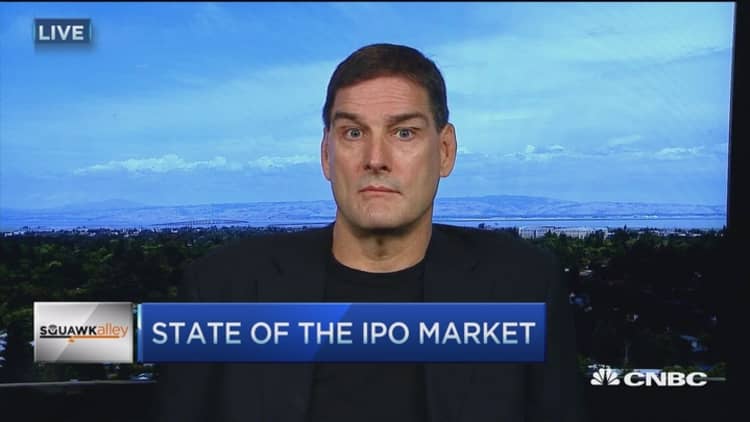The tech IPO market is frozen. Storage vendor Nutanix is further proof.
It's been over three months since Square and Match Group debuted, and not a single software or Internet company has followed. Seven of the past 10 technology companies to go public are trading below their offer price, and four are down by at least 20 percent, according to FactSet.
Nutanix, which filed its IPO prospectus in December, is holding off on selling shares until the stock market volatility wanes, said sources familiar with the matter. The developer of data center technology that wraps together storage, servers and virtualization was set to go public in late January, but has been advised by its bankers to wait for the market to calm, said the sources, who asked not to be named because the discussions are private.
A spokesperson for San Jose, California-based Nutanix declined to comment. The banks include , Morgan Stanley and JPMorgan.
No other high-profile tech companies are publicly on file. Last month, online lender Elevate Credit delayed its IPO due to market conditions, as January marked the worst month for the Nasdaq since 2010. The index is still down 8.5 percent to start the year even after rallying over the past week.
"Since companies don't know what the outlook will be, they're saying let's hold off," said Aftab Jamil, a partner and leader of the technology and life sciences practice at accounting and consulting firm BDO USA. "That sentiment is definitely there."
According to BDO's recent annual survey of 100 tech companies, fewer than half of chief financial officers expect valuations to increase in 2016.
For Silicon Valley's financiers, this is all troubling. Big IPOs are their lifeblood. That's how venture investors make outsized profits and justify the billions of dollars they pour annually into start-ups that ultimately go bust or fail to generate returns.
Last year should have been a banner year for IPOs. The Nasdaq topped 5,000 for the first time since 2000, and rose for the fourth consecutive year. Investors expressed appetite for risk, bidding up Amazon.com and Netflix, the year's two best large-cap performers.
Yet, tech companies went public at the slowest pace since 2009.

Instead of IPOs, the highest growth companies were raising mega-rounds of cash in the private market at valuations and revenue multiples that exceeded what public investors were paying. Hedge funds and private equity firms distorted the IPO cycle, putting piles of cash into companies but without rewarding early investors and employees the way public offerings do.
Late-stage private financing almost doubled from $8.9 billion in 2013 to $16 billion last year, according to the National Venture Capital Association, with companies including Uber, Airbnb, SpaceX and SoFi each reeling in at least $1 billion.
Those businesses presumably raised enough to last a while, but many of the 140-plus venture-backed companies valued at $1 billion or more are going to have to accept a more rational environment, said venture capitalist David Golden.
Read MoreStart-up funding plunged in fourth quarter
That could mean a painfully dilutive private investment round, selling the business at a loss to some investors or going public at a price below what earlier investors paid.
"People just have to get real," said Golden, a managing partner at Revolution Ventures in San Francisco and former director of JPMorgan's technology investment banking practice. "When markets are speaking, we may not like what they're saying but we have to listen."
The Nutanix IPO, which sources say is still set to happen when markets stabilize, will be an instructive event. As one of Silicon Valley's hyper-growth enterprise tech businesses, the company raised $145 million in 2014 at a valuation of over $2 billion, or $13.40 a share.
According to Nutanix's prospectus, the fair value of its Series D (early 2014 financing round) convertible preferred stock climbed 53 percent from $10.72 in July 2014, to $16.36 as of October 2015.
Any comparison to recent activity in the public market suggests that Nutanix will be forced to reckon with a new reality. Nimble Storage has lost almost three-quarters of its value since October, while Pure Storage is down about 25 percent from its Oct. 7 debut price.
More broadly, anything in software that involves high growth without profitability is getting crushed. The Bessemer Venture Partners Cloud Index, which tracks 43 publicly traded cloud software vendors, has plunged 29 percent since January.
Nutanix's board will have a tough decision. Should the company go forward with its IPO and price shares below $10.93, a group of investors from 2013 and 2014 would be issued additional stock, further diluting the rest of its shareholder base.
It's the type of protection, known as a ratchet, that was built into many late-stage, high-priced rounds in recent years, notably by investors in Box and Square.
But just as the IPO market has seized up, private rounds have also become more challenging, with nontraditional investors leaving the arena.
There's no easy way out for Nutanix. And looking at its numbers, unless the company cuts costs and sacrifices growth, it will eventually need outside capital. In 2015, Nutanix spent $161.8 million on sales and marketing, accounting for 67 percent of revenue. It recorded a net loss of $126.1 million, slightly less than its total cash and equivalents on the books.
Between July 2013 and October 2015, its employee base jumped more than fivefold from 247 to 1,368, "and we expect to have significant headcount increases in the future," the filing said.
Dow vs. Nasdaq
That's a big reason why the company filed to raise up to $200 million in its initial prospectus.
The IPO proceeds plus the company's cash, short-term investments, and borrowing capability should be sufficient to meet its capital needs for the next 12 months, according to the prospectus.
The first thing Nutanix or any other venture-backed company needs to see is a less volatile stock market, said Revolution's Golden. Nineteen times this year the Dow has closed up or down by at least 200 points.
Read MoreSilicon Valley cash party comes to end
"When you're swinging up and down a couple hundred points a day, investors don't have confidence and underwriters have a tough time pricing a stock," Golden said.
After the market stabilizes, company boards can go through the painful process of letting public market investors revalue their business and can then determine if an offering is worth the risk.
"For the right company at the right price, you can sell stock," Golden said. "It's a question of what the selling shareholder is prepared to take that determines whether the IPO market is open or closed."









